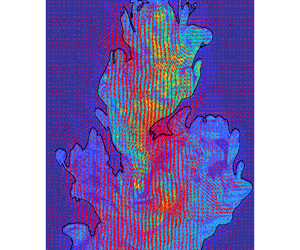Crossref Citations
This article has been cited by the following publications. This list is generated based on data provided by
Crossref.
George, Nitheesh
Ooi, Andrew
and
Philip, Jimmy
2021.
Evolution of a wall-attached buoyant plume in confined boxes: Direct numerical simulations, entrainment coefficient and an integral model.
International Journal of Heat and Fluid Flow,
Vol. 90,
Issue. ,
p.
108824.
Ke, Junhao
Williamson, N.
Armfield, S.W.
Komiya, A.
and
Norris, S.E.
2021.
High Grashof number turbulent natural convection on an infinite vertical wall.
Journal of Fluid Mechanics,
Vol. 929,
Issue. ,
Mader, Johanna
van Reeuwijk, Maarten
and
Craske, John
2021.
Confined turbulent convection driven by a combination of line and distributed sources of buoyancy.
Physical Review Fluids,
Vol. 6,
Issue. 2,
Li, Shuo
and
Flynn, M. R.
2021.
Boussinesq and non-Boussinesq turbulent plumes in a corner with applications to natural ventilation.
Physical Review Fluids,
Vol. 6,
Issue. 5,
Kapil, Mohnish
Sutherland, Bruce R.
and
Balasubramanian, Sridhar
2021.
Spreading and sedimentation from bottom-propagating particle-bearing jets.
Journal of Fluid Mechanics,
Vol. 907,
Issue. ,
Parker, D. A.
Burridge, H. C.
Partridge, J. L.
Hacker, J. N.
and
Linden, P. F.
2021.
Vertically distributed wall sources of buoyancy. Part 2. Unventilated and ventilated confined spaces.
Journal of Fluid Mechanics,
Vol. 907,
Issue. ,
McConnochie, Craig D.
Cenedese, Claudia
and
McElwaine, Jim N.
2021.
Entrainment into particle-laden turbulent plumes.
Physical Review Fluids,
Vol. 6,
Issue. 12,
Parker, D. A.
Burridge, H. C.
Partridge, J. L.
and
Linden, P. F.
2021.
Vertically distributed wall sources of buoyancy. Part 1. Unconfined.
Journal of Fluid Mechanics,
Vol. 907,
Issue. ,
Richardson, James
and
Hunt, Gary R.
2022.
What is the entrainment coefficient of a pure turbulent line plume?.
Journal of Fluid Mechanics,
Vol. 934,
Issue. ,
Sahebjam, Rana
Kohan, Khashayar F.
and
Gaskin, Susan
2022.
The dynamics of an axisymmetric turbulent jet in ambient turbulence interpreted from the passive scalar field statistics.
Physics of Fluids,
Vol. 34,
Issue. 1,
Hunt, Gary R.
and
Webb, Jamie P.
2022.
Two-dimensional buoyant plumes in a uniform co-flow.
Journal of Fluid Mechanics,
Vol. 932,
Issue. ,
Kaye, Nigel B.
Robinson, Dylan M.
Akhter, Romana
Ahsanullah, Md Safwan
Jordan, Ta’Jon A.
and
Martinez, Oscar E.
2022.
The transition of a line plume to round plume.
Environmental Fluid Mechanics,
Vol. 22,
Issue. 4,
p.
763.
2023.
Effects of polymer additives on the entrainment of turbulent water jet.
Physics of Fluids,
Vol. 35,
Issue. 4,
Charlwood, Samuel
Frank, Daria
and
Davies Wykes, Megan
2023.
The influence of buoyancy upon pollution trapping and dispersal in the wake of a backward-facing step.
Flow,
Vol. 3,
Issue. ,
Kohan, Khashayar F.
and
Gaskin, Susan J.
2023.
Scalar interfaces in the near field of a unity velocity ratio coaxial jet.
Physics of Fluids,
Vol. 35,
Issue. 3,
McConnochie, C. D.
and
Cenedese, C.
2023.
Increased Melting of Marine‐Terminating Glaciers by Sediment‐Laden Plumes.
Geophysical Research Letters,
Vol. 50,
Issue. 20,
Zúñiga, Santiago L.
Balachandar, S.
Yang, Y.
Zhang, Y.
Smith, K.
Loppi, N.
Cantero, M. I.
and
Kerkemeier, S.
2024.
Planar wall plumes bounded by vertical and inclined surfaces.
Physics of Fluids,
Vol. 36,
Issue. 3,
Zhao, Kun
Chen, Wei
Li, Situo
Lin, Ziming
and
Wang, Huikun
2024.
The effect of fire-wall distance on the flame attachment characteristics and flame height of near-wall fires.
Journal of Building Engineering,
Vol. 98,
Issue. ,
p.
111292.
Kohan, Khashayar F.
and
Gaskin, Susan J.
2024.
Scalar mixing and entrainment in an axisymmetric jet subjected to external turbulence.
Physics of Fluids,
Vol. 36,
Issue. 10,
Yerragolam, Guru Sreevanshu
Howland, Christopher J.
Yang, Rui
Stevens, Richard J.A.M.
Verzicco, Roberto
and
Lohse, Detlef
2024.
Effect of airflow rate on CO2 concentration in downflow indoor ventilation.
Indoor Environments,
Vol. 1,
Issue. 2,
p.
100012.


